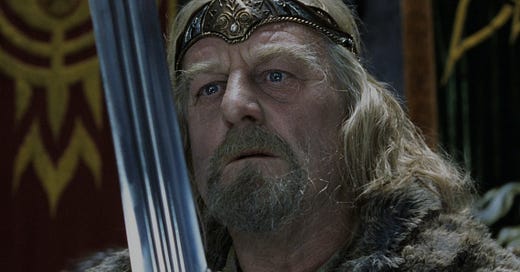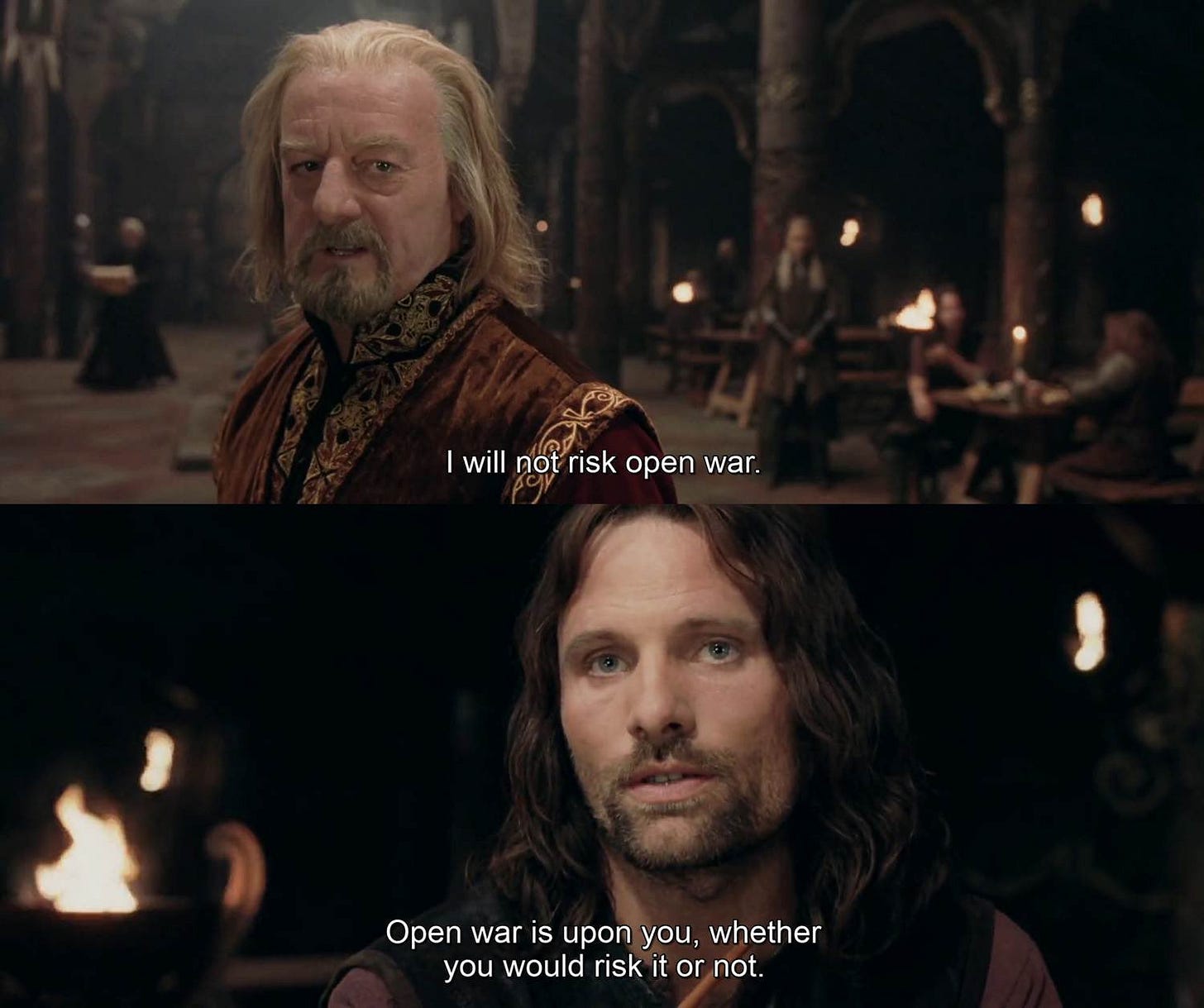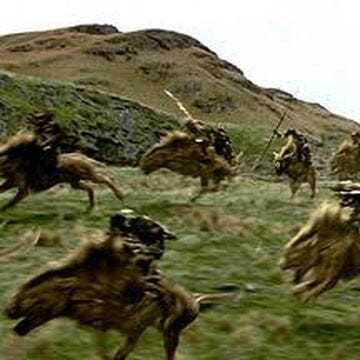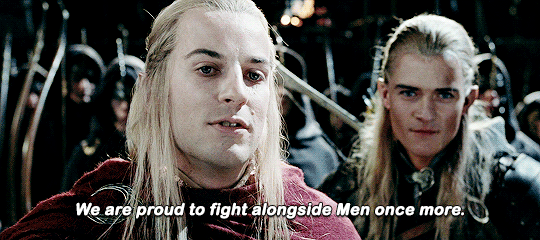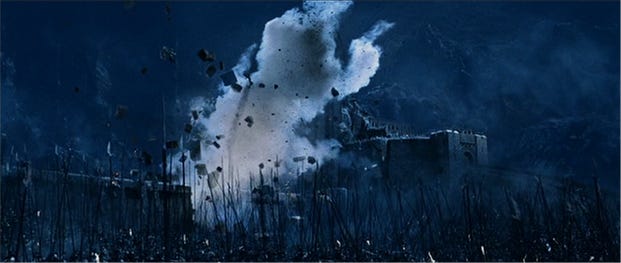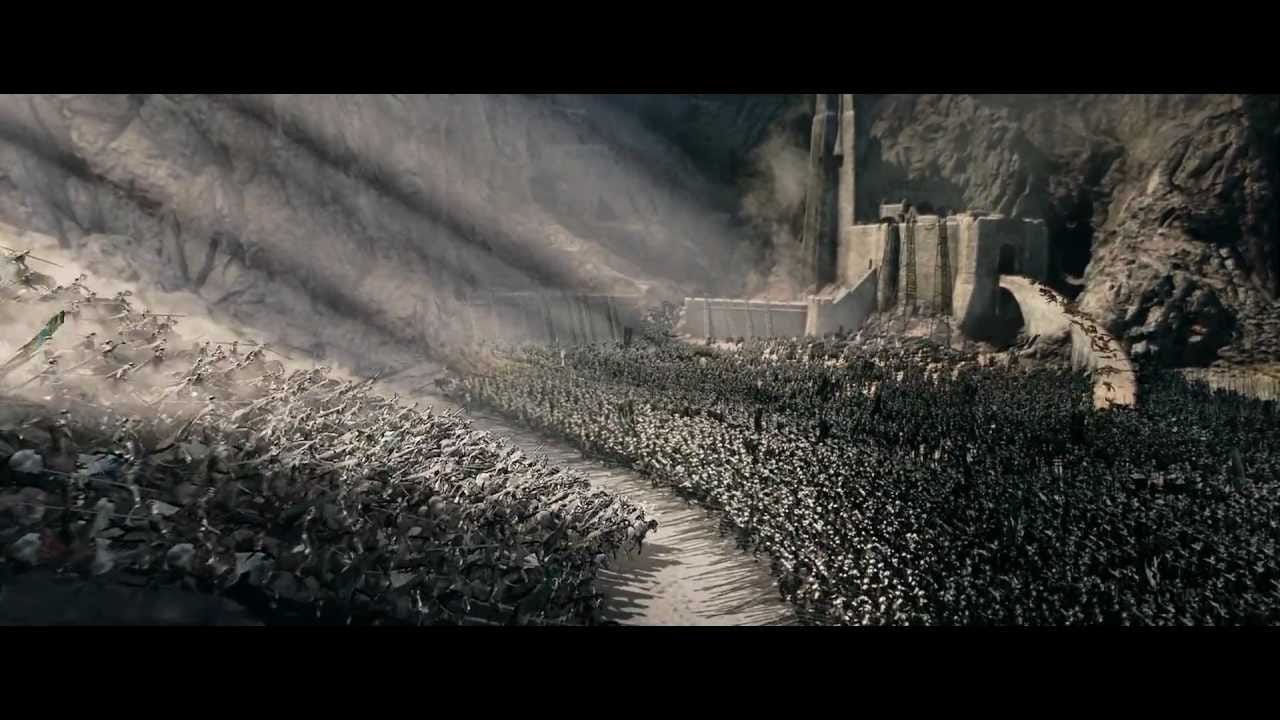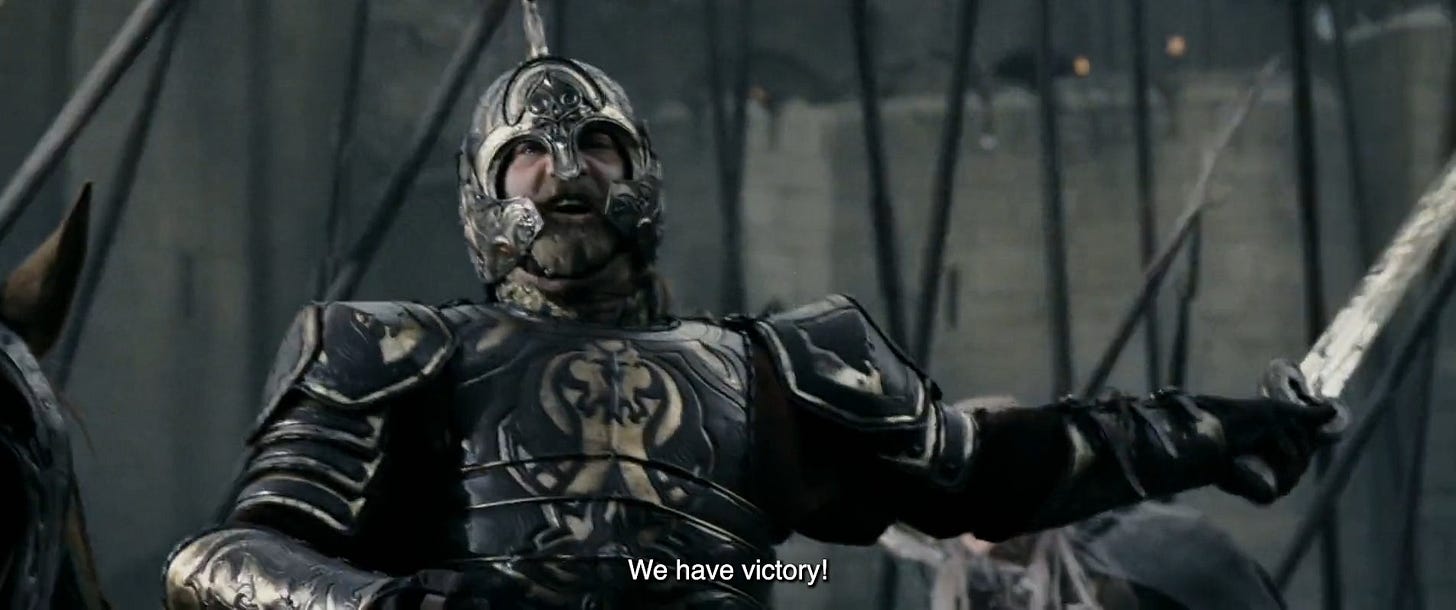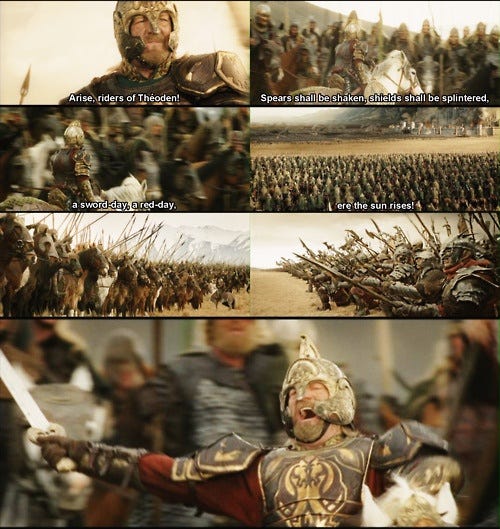#29: Depression, Northern Courage, and The Lord of The Rings
King Theoden is the embodiment of Northern Courage, and of someone successfully recovering from depression to become who they really are.
I feel the stress of Being A Writer On The Internet Again—there’s a sense of expectation that comes with regular publishing. I want my pieces to read well. I want my readers to feel something. I want to put myself into what I write.
But perfect is the enemy of good. In order to write the shimmering, erudite essays my heart desires, I need to write hundreds more mediocre ones. So my plan is to keep writing, regardless of how worthy the subject matter seems to be.
Coming up are newsletters about my 2023 in review and 2024 intentions, my unusual experiences with IFS therapy, and my thoughts on an emerging cluster of technology I think of as “decentralisation tech”.
If you want to subscribe to read those you can do so here:
But this issue is about none of those things. It’s about depression and its embodiment in King Theoden, a character in the Lord of The Rings.
Depression, Northern Courage, and Becoming who you are meant to be
Is there a movie scene that reliably makes you cry?
For me, it’s Theoden’s battle speech in the last LOTR film.
I watched it once, especially fragile while recovering from flu, and I cried like a baby. Every time I’ve seen it since I always shed a few tears.
Arise, arise riders of rohan.
A red day, a sword day, ere the sun rises!
Spears shall be splintered, shields shall be broken,
Ride now, ride now, ride now, for ruin and the red dawn.
Death! Death! Death!
Forth Eorlingas!
Did you know Tolkien wrote that speech in one sitting, on the back of an unused exam paper?
It was one of the first passages in what would eventually become the Lord of the Rings.
Tolkein was moved by the concept of “Northern courage”, and King Theoden is the embodiment of this idea in LOTR. Theoden knows that he will die in battle. In fact, he believes his life has not been meaningful unless he dies in battle.
In the end, he shows courage to do the right thing and save his allies, even though he knows it will lead to his death.
But when we first meet Theoden’s character, he is far from the heroic figure leading his people into battle. He is a husk, in a deep depression, under the spell of an evil wizard.
Recently, I realised that we can learn something about depression by looking closely at Theoden’s character arc.
Theoden traverses an eight point cycle familiar to anyone emerging from depression:
Depression
Being forced to accept reality
Recovered, but reclusive
Recluding back into oneself
Being surprised by an act of kindness
Becoming oneself
Asking for help and receiving it
Full circle—helping someone else
I’m going to briefly explore each part here.
1. King Theoden’s Depression
We first encounter Theoden at Edoras, the withering capital city of his people, the people of Rohan. Theoden, a shell of a man, has been spellbound by the evil wizard Saruman.
Saruman’s lackey, Grima Wormtongue, is the de-facto ruler of the realm, whispering poison into Theoden’s ear. His son has been killed, he’s banished his nephew, and he’s unable to recognise the face of his beautiful niece, Eowyn.
We can see Theoden is in the darkest pit of depression, what a friend of mine calls “the cavern of despair”. He’s not in his right mind. He has cast away even his own family—not even those who love him most are able to help.
2. Gandalf forces Theoden to accept reality
Fortunately, Theoden has a friend in the good wizard, Gandalf.
Gandalf and the boys rock up, overcome Wormtongue and his accomplices, and Gandalf releases Theoden from the spell he’s under. The colour returns to his face, and his eyes begin to shine again.
He draws his sword, and we see not just life, but vitality, return to him. He drives Wormtongue—representing his depression—out of his city.
Theoden is the leader of a warlike nation; the sword is the source of his power. To possess Theoden, Saruman had to disconnect him from this power source.
The same is true of anyone in a depression. We become disconnected from the source of our power. We stop doing the things that make us feel alive.
It’s only when you start doing the things that make you—and only you—feel alive, and powerful, that you have truly overcome a depressive spell. But that doesn’t mean you’ve fully healed.
3. Theoden is recovered, but afraid
King Theoden is back—but not yet better than ever. There’s a war on his doorstep. Saruman is sacking his villages, killing his people. Aragorn and Gandalf urge Theoden to muster the Rohirrim—his famous horse warriors—and ride out to meet Saruman’s army head on.
But Theoden is afraid, and embarrassed of having neglected his people for so long. He wants to protect them.
Instead of taking the initiative, and embracing the source of his power—his horse riding warriors—he retreats to the fortress of Helm’s Deep, where he can’t even use his cavalry. He hopes to weather the storm.
Theoden is afraid to call his warriors to help him, because he feels that his absence has let his people down. And he did let them down—he even banished his own nephew and heir! He’s afraid to ask other nations (of elves, men) for help because he thinks no one cares about him.
He is afraid to ask for help.
This is a common feeling when returning from a depressive spell. Often, in your depression, you really have been absent, ignored your friends, and maybe even hurt them. It’s scary and embarrassing to ask for help.
4. Theoden recludes back into himself, into the fortress of Helms Deep
Ultimately, Theoden deems his only course of action is to reclude back into himself, into the mountain fortress of Helm’s Deep.
Instead of taking the initiative, he decides to weather Saruman’s storm, to grimace and bear the pain. He migrates what’s left of his nation to Helm’s Deep, losing the opportunity to meet Saruman in the field of battle.
This has disastrous consequences.
He is ambushed en-route, incurring even more losses. Only a fraction of his forces successfully make it to Helm’s Deep.
Theoden’s fear of fully connecting to his people causes him to self-sabotage. Now they arrive in Helm’s Deep in worse shape than ever.
5. The elves perform an act of kindness
But all hope is not lost. Theoden really does have friends—even if he doesn’t know it yet.
An elf called Haldir arrives with a cadre of archers to bolster Theoden’s defences. Theoden’s cavalry can’t be used in a siege, but the Elvish arrows provide a decisive advantage that helps Theoden’s people—barely—get through the night.
More importantly, the arrival of the Elves teaches Theoden that he’s not alone.
There are good people in the world who are willing to help him. This is something people coming out of depression have to learn and re-learn. People want to help you!
6. Facing death, Theoden becomes himself, and asks for help
Unfortunately for Theoden, Elves alone can’t save him, and as dawn breaks, his people are in dire straits.
The wall is breached, and what’s left of Theoden’s warriors have retreated into the throne room. Theoden has given up.
“What can man do against such reckless hate?” he asks Aragorn, the only man whose heart is still in the fight.
“Ride out and meet them. Ride out and meet them, head on.”
“Yes! For death and glory.”
“For Rohan.”
In this moment, Theoden reconnects with his true source of power. He mounts his horse, draws his sword, and finds his Northern Courage.
At the moment where he accepts his own death, he surrenders, and becomes fully himself.
The orchestral banger Forth Eorlingas blasts out of my speakers and Theoden heroically charges into apparent certain death. I’m not crying, you’re crying.
Theoden gives orders to sound the horn of Helm Hammerhand—his ancestor—which sounds the alarm far and wide, telling any possible allies that Rohan is under mortal attack.
Theoden rides into battle, into his certain death, to save his people and make his ancestors proud. But in sounding the horn he does something equally courageous. He finally asks for help.
7. Help arrives
And since this is a feel-good family movie, help arrives right on time.
Eomer and Gandalf arrive with 2,000 of their best long-haired, spear-wielding, horselord warriors in tow. They ride down the steepest shale slope I’ve ever seen before routing the enemy in the morning sunlight. Rohan is saved. And Theoden is too.
8. Full circle—Theoden rides: to help Gondor, and to his death
Theoden’s story ends in the third book.
He was unwilling to ask for help when his people were under attack. He believed no one would come to his aid, that no one cared.
But the care of others saved him. His family and friends came to his aid and fought with him to victory, even when the odds looked impossible.
Now Theoden does for another what he couldn’t do for himself.
When the flaming beacons of Minas Tirith are lit, Gondor calls for aid. And Rohan answers.
Theoden musters the Rohirrim. He gathers 10,000 mounted warriors—the entirety of his dwindling race—and they ride for 3 days and nights to the Pelennor Fields, where the nation of Gondor is undergoing its own existential siege, a mirror image of the one Theoden faced at Helm’s Deep.
At last, he is fully connected to the source of his power, and he uses it to help someone truly in need.
He is the embodiment of Northern Courage. Even though he knows he will die, he does what is right anyway.
Theoden rides to his death. And in doing so, he fully becomes himself.
Ride now! Ride now! For ruin and the red dawn!
Death! Death! Death!
What’s the source of your power?
What can you do to truly become yourself?

